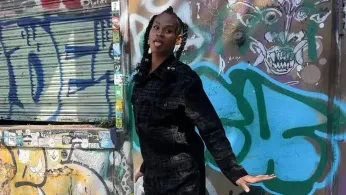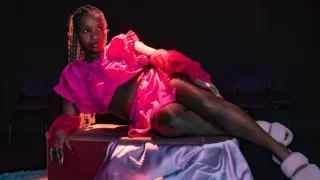
5 hours ago
Infinite Coles Confronts Father Ghostface Killah and Reclaims Identity in Debut Album ‘SweetFace Killah’
READ TIME: 4 MIN.
Infinite Coles, a New York City-born artist, performer, and model, has long been a distinctive presence in both the underground ballroom scene and alternative R&B circles. Now, with the announcement of his debut album ‘SweetFace Killah,’ Coles is stepping forcefully into the limelight—not just as an artist, but as a bold voice for queer empowerment and family reconciliation .
The 12-track album, produced by Zach Witness—known for collaborations with Frank Ocean and Erykah Badu—draws on the emotional textures of ballroom, R&B, and rap to tell a story that is uniquely Infinite’s own. The project’s standout tracks include ‘BGM,’ ‘Boots Ballroom C*nt Mix,’ and ‘Mama Song,’ each exploring different facets of queer experience, resilience, and the search for acceptance.
Central to the album’s narrative are the dual singles ‘SweetFace Killah’ and ‘Dad & I.’ The former is described by Coles as the transformation of an online slur into a queer anthem. “At first, I was depressed and embarrassed, but I took the name and made it mean something more than what they were using it for. Now I’m owning it, because honestly, it’s FABBBB, like they ate that!” Coles stated, highlighting both the pain and triumph inherent in reclaiming hurtful language .
‘Dad & I’ is a raw, emotional letter to his estranged father, Ghostface Killah, a legendary figure in hip-hop. In the song, Coles expresses both his anger and his enduring love, writing, “Even though I’m angry and hurt … I forgive you and I love you.” This vulnerability, rarely seen in mainstream music, is being hailed as a significant moment in both hip-hop and LGBTQ+ storytelling .
The act of reclaiming slurs and harmful stereotypes has been a central theme in queer art for decades. Infinite Coles’ decision to transform ‘SweetFace Killah’—a phrase weaponized against him online—into the title of his debut album and lead single is a powerful assertion of agency. By taking ownership of the language used to marginalize him, Coles joins a lineage of LGBTQ+ artists who have subverted mainstream narratives to foster community and self-acceptance .
The music video for ‘SweetFace Killah,’ released on YouTube, further amplifies this message with visuals rooted in ballroom culture, gender fluidity, and unapologetic queer celebration .
Coles’ relationship with his father, Ghostface Killah, has frequently been the subject of public scrutiny and online commentary. In interviews and on social media, Coles has been candid about the challenges of growing up as the openly gay son of a hip-hop icon in an industry and culture that has often been criticized for its homophobia and transphobia .
‘Dad & I’ serves as both an indictment and an olive branch. The song does not shy away from the pain of rejection but ultimately lands on a message of forgiveness and hope for reconciliation. This public airing of personal history is already resonating with listeners who see their own stories reflected in Coles’ journey.
The album’s soundscape is heavily influenced by ballroom culture—a historically Black and Latinx LGBTQ+ movement that has birthed both a genre of music and an enduring tradition of resistance through art. Tracks like ‘Boots Ballroom C*nt Mix’ are filled with references to the language and energy of ballroom, while collaborators like Ugly Worldwide and Robot Moonjuice add to the record’s authenticity and diversity .
Coles has emphasized the importance of his creative community, thanking his collaborators publicly and affirming the role of chosen family in his artistic process. This focus on collaboration and mutual support reflects broader trends within LGBTQ+ culture, where resilience is often found in the bonds between artists, friends, and supporters.
The release of ‘SweetFace Killah’ marks a milestone for LGBTQ+ visibility within hip-hop—a genre where queer artists have historically faced barriers to acceptance. While progress has been made in recent years, with artists like Lil Nas X and Cakes Da Killa making headlines, the genre still has a long way to go in embracing diversity. Coles’ album contributes to ongoing conversations about representation, family, and the intersection of race, sexuality, and art.
By sharing his story on his own terms, Infinite Coles challenges long-standing stereotypes and encourages other queer artists to claim their space in the industry .
With ‘SweetFace Killah’ scheduled for release on December 5, anticipation is high among fans and critics alike. The album’s blend of genres, honest lyricism, and unapologetic celebration of queer identity position it as a landmark release in both pop and LGBTQ+ music for 2025 .
Coles has expressed excitement and pride over the culmination of his journey, stating, “I am proud and excited to announce my debut album. It is the culmination of my journey and I can’t wait to share it with the world.” As the conversation around the album grows, Infinite Coles stands as both an artist and an advocate—a testament to the power of queer creativity, resilience, and the ongoing fight for acceptance and understanding.






